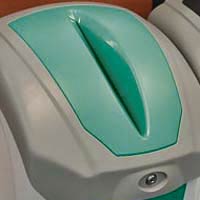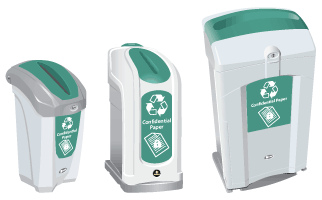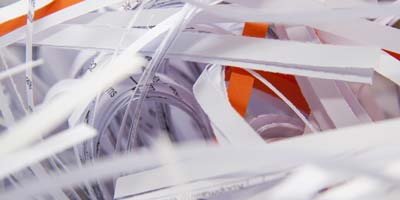Personal and sensitive business data is often classified as private or confidential, and should be securely processed to make sure it stays that way – but is this always the case?
A global study* recently found that 95% of managers and employees are concerned about security risks when it comes to confidential documents, and yet only 41% have effective security solutions in place.
What measures can your organization take to ensure confidential data stays confidential? We’ve compiled some tips and considerations to help you manage and dispose of private and personal documents.
FAQ - To Print or Not to Print?
As the majority of data is now processed electronically, many businesses are tackling the security issues associated with confidential paper documents by implementing a ‘No Print’ rule.

By establishing a ‘No Print’ rule across the organization, access to a shared printer or copier should be limited. You should also ensure your employees are trained to ask themselves questions before sending a document to print:
- Is this a confidential document?
- Does it contain any personal or sensitive information?
- For what purpose do I require a hard copy?
- What will I do with the paper document once I have actioned the associated task?
Introducing this kind of technical measure may take time to embed into the day-to-day office culture, but it will greatly improve your data security. Combatting the risks of paper documents can also help to reduce the costs associated with paper and printing - and it will benefit the environment too.
For added security measures, we would also recommend making sure your employees lock their screens when not in use and keep their desks free from paper documents wherever possible.
FAQ - When the 'No Print' Rule Fails, How Should I Store Confidential Documents?
Occasionally, printing confidential documents may be unavoidable. Some legal or industry-specific policies and practices may require hard copies containing sensitive or personal data.
When this is the case, physical documents should be processed in a manner that ensures appropriate security of the personal data.
You should consider:

- The quality of doors and locks, security alarms, lighting and video surveillance
- How you control access to your premises, and how visitors are supervised
- Where the documents are kept during the day
- How you dispose of any paper waste once finished with
You should only keep personal data as long as is necessary to fulfil the purposes required.
FAQ - How Should I Manage Confidential Waste?
Conduct a waste audit to enable you to find the best waste management solutions for your building or premises. Your waste audit should cover:
- Areas on site where confidential waste is generated
- The quantity of this waste in each given area
- The people required to oversee the collection and disposal of your confidential documents
Once your waste audit is complete, you can then proceed to selecting the right confidential waste bin for your organization.
Key qualities you should consider in secure paper containers:

- Security:
Strong lockable shredding containers with solid enclosed lids and thin paper apertures are recommended.
In high-risk areas, you should consider fixing the bins to the ground or wall to prevent removal by unauthorized personnel.
For areas where this is not suitable, store your containers out of sight inside desks or storage units.
- Capacity:
Select containers with large enough capacities to suit the volume of waste produced in the desired location.
Ranging from a small 8-gallons to a large 36-gallons, our range of confidential shredding bins is bound to have the right solution for your location.
Larger containers mean a larger footprint, so always ensure you have a location in mind when selecting your chosen container.

- Style:
Having a professional and smart container to store documents prior to shredding is vital when portraying how seriously you consider data protection within your organization.
This will reflect upon employees, customers and visitors and so should be a key consideration.
- Location:
It is recommended to place your confidential document containers away from other paper recycling bins to minimize the risk of incorrect disposal.
Place the containers in areas highlighted by your waste management audit for maximum success. You could even create a confidentiality zone complete with posters and tips to remind your employees about the importance of data security.
FAQ - How Can I Securely Dispose of Confidential Waste?
All confidential waste should be collected and destroyed separately from any non-confidential waste before it can be recycled.

Empty your confidential shredding bins into security bags which you can securely seal prior to shredding or collection by a waste contractor.
To ensure your data is handled with optimum security, you should select between on-site and off-site waste destruction. These documents must be shredded sufficiently to ensure that your documents cannot be accessed or viewed by anyone outside your organization.
Once shredded, your confidential documents can successfully be recycled.
For more information about our range of secure paper containers, please browse our website or talk to one of our specialist advisors via LiveChat today.
Source:*http://www.bpinetwork.org/getting-control-of-document-flow-infographic




